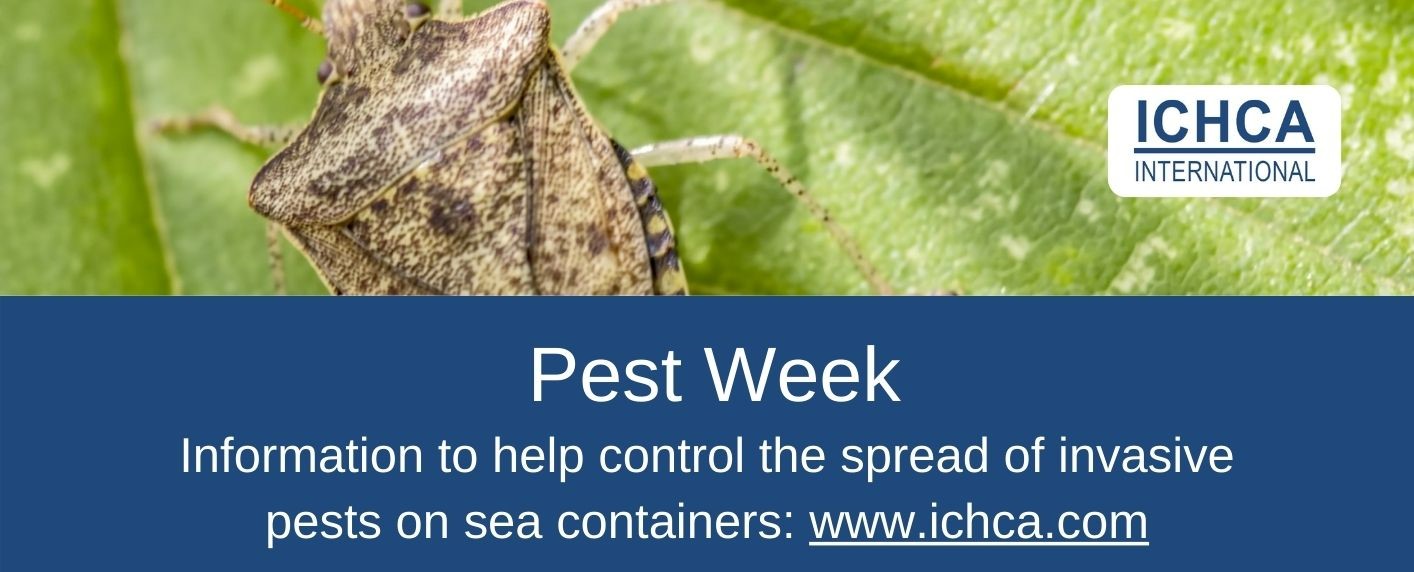Pest Week – Day 5: IPPC Sea Container international workshop, 19 – 20 September
Today’s content was produced by: the contributors to day 1 of the IPPC Sea Container international workshop, London, 19 – 20 September 2022.
The workshop brought together plant protection organisations and industry in a powerful learning and sharing event. Over 30 presenters addressed wide-ranging topics for two days that were impressively designed and executed by the steering committee: Teppei Shigemi (Japan), Wendy Asbil (Canada), Lars Kjaer (WSC), Lise Kjærgaard Steffensen (Denmark), Frederik Koome Makathima (Kenya), James Hookham (GSF) in partnership with Artur Shamilov (IPPC Secretariat lead).
Day 1 of the workshop set the scene for the complexity of the containerised supply chain. It introduced the history of, and challenges that have been faced in, seeking to minimise pest contamination in the sea container supply chain. The formation, activity and final report of the Sea Containers Task Force (SCTF) was described.
Various stakeholders discussed the SCTF report and the arising issues. This included commentary by container operators and shipping lines; container service providers; ports and terminals; shippers and forwarders. The roles and responsibilities of actors in the supply chain were explored. Each of these presentations made it clear that there was no simple or single solution to minimising pest contamination. It was also emphasized that 100% contamination free was not practicable.
There were presentations from national plant protection organisations on alliances and innovation in inspection and engagement in North America, China and Australia and New Zealand. A summary of inspection findings from Kenya spotlighted the concrete reality of risk.
Delegates also heard from the ceramics and coffee sectors on industry led initiatives and activities with transferrable potential and valuable learning.
Throughout the day, the CTU Code was referenced and in some cases directly discussed, including the introduction of new IMO guidelines for invasive pest inspection.
It would take too much text here to cover all the presentations. The attached document briefly summarizes each presentation and provides a link to the full slide set. In providing the summaries, any error or omission is ICHCA’s responsibility, and we recommend that you visit the presenters’ actual slides for any topic that is of interest. A summary of Day 2 will follow.
- Full Slide set… International workshop on reducing the introduction of pests through the sea container pathway: https://www.ippc.int/en/core-activities/capacity-development/sea-containers/international-workshop-on-reducing-the-introduction-of-pests-through-the-sea-container-pathway/
The workshop, CPM Focus Group and its Industry Advisory Group activity complements the Code of Practice for Packing Cargo Transport Units (CTU Code).
Background
World food security and biodiversity is at risk from contaminating pests. Plant pests and diseases are responsible for the loss of up to 40% of global food crops and trade losses exceeding $220bn annually. The UN Commission on Phytosanitary Measures’ expert Focus Group and Industry Advisory Group are looking at potential pest contamination on sea containers. In particular: container exterior and interior cleanliness, cargo cleanliness as well as risks of pest contamination in the international containerized supply chain. ICHCA is part of the Industry Advisory group.
Following on from the successful international sea container conference last week, we are taking the opportunity to promote current guidance and information from various sources that address the management of invasive pest risk.
The workshop
Was designed to:
- better understand the advantages and disadvantages of potential ways to address the issue of sea container/cargo pest contamination
- enhance knowledge of factors limiting the development of new measures and implementation of a CPM Recommendation and/or an ISPM
- analyze how potential targeted measures could address pest contamination of sea containers/cargoes and achieve reasonable risk reduction with minimal impact on container logistics
- raise awareness among the IPPC community on guidelines/recommendations/etc. to reduce phytosanitary risk in the sea container pathway
- demonstrate importance of cross-regional and global cooperation to increase understanding of the information and prerequisites for developing successful measures.
Intended outcomes:
- raised awareness of risks and impacts of moving pests that are harmful to plants via sea containers and their cargoes and promoted the importance of avoiding contamination of containers and their cargoes by all parties in the global supply chains
- identified and discussed questions on issues that remain unanswered/require further clarification
- explored and discussed practical and cost-effective solutions to reducing risks of transfer of pests/contaminants by the sea container pathway
- make practical and sustainable recommendations to globally address the pest risks associated with sea containers/cargo movement that can be considered by CPM Focus Group in close collaboration with the Industry Advisory Group.

